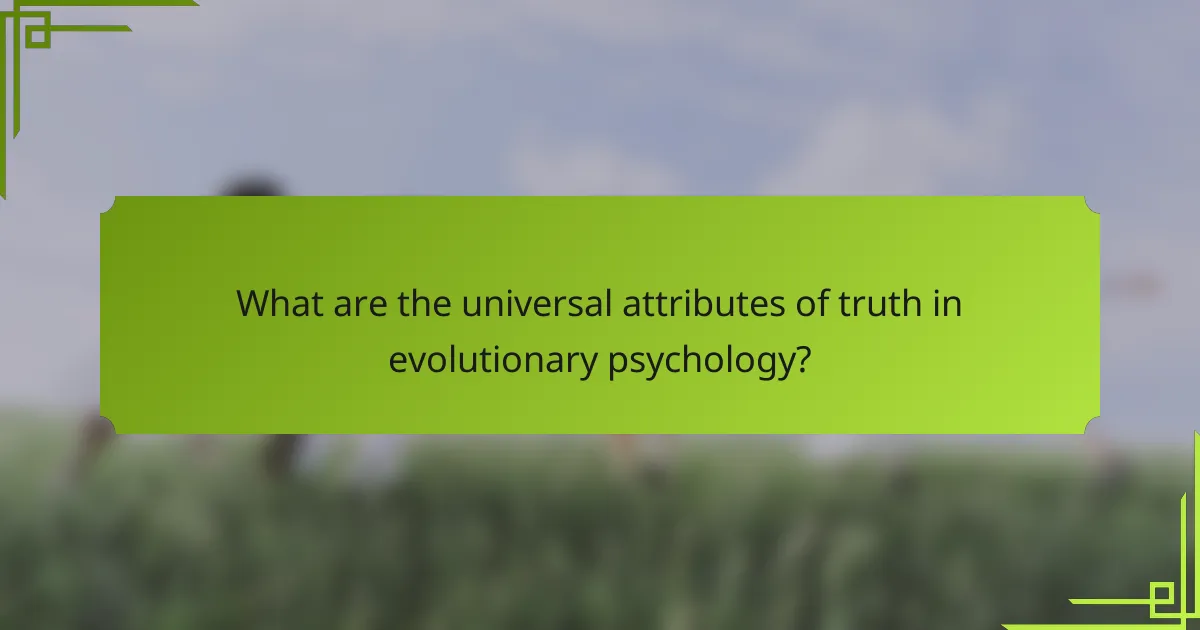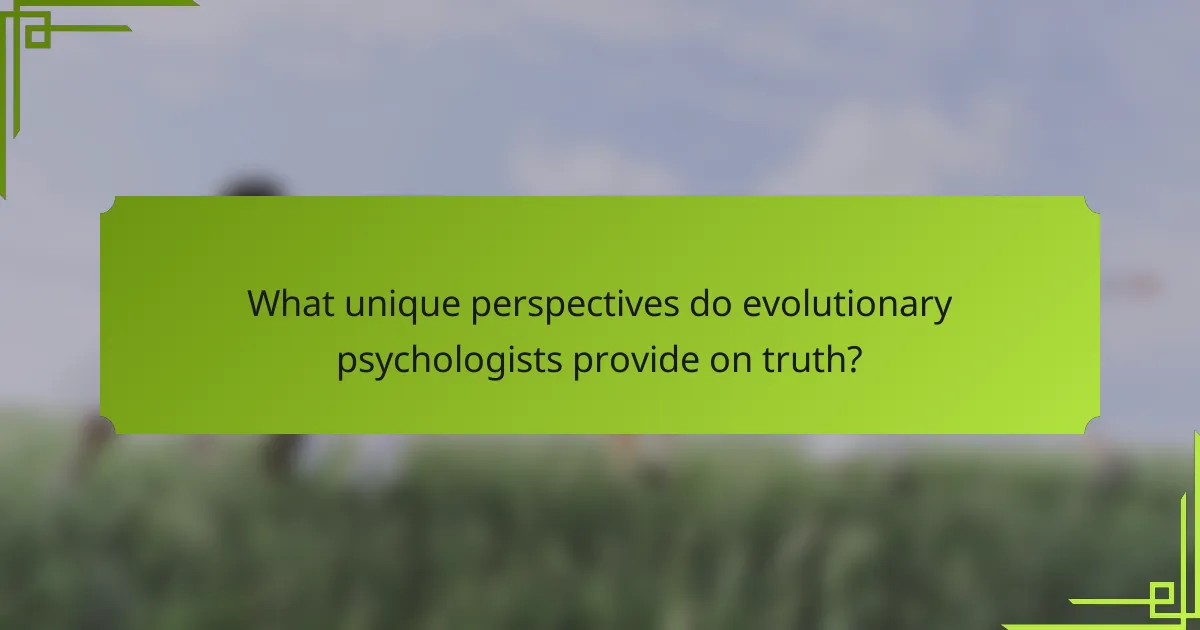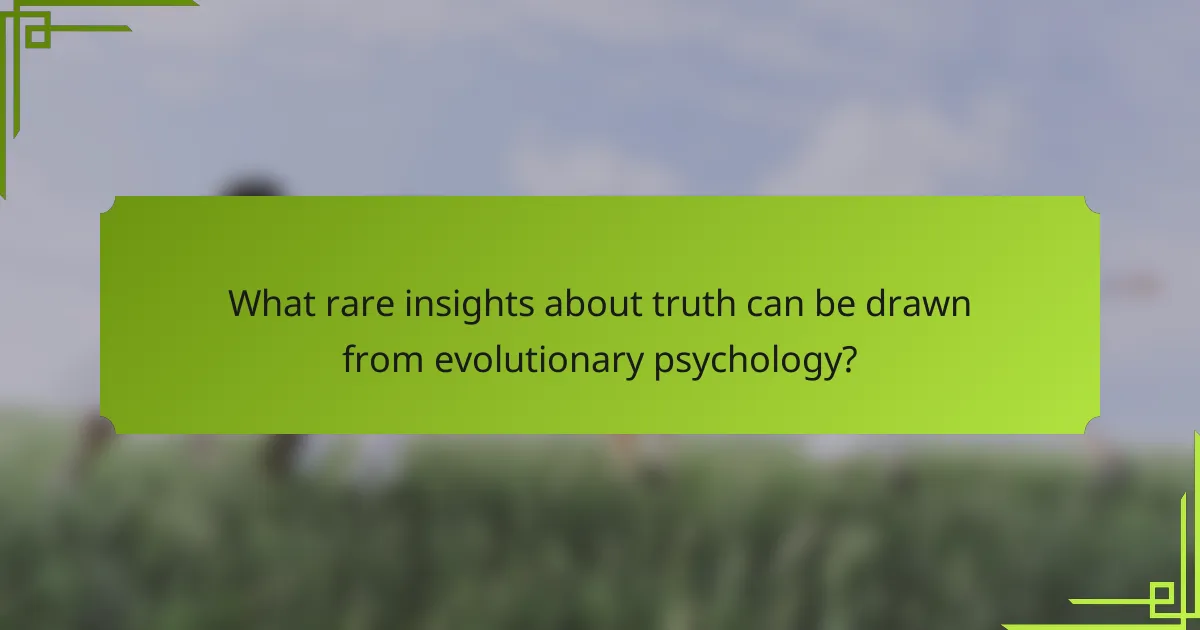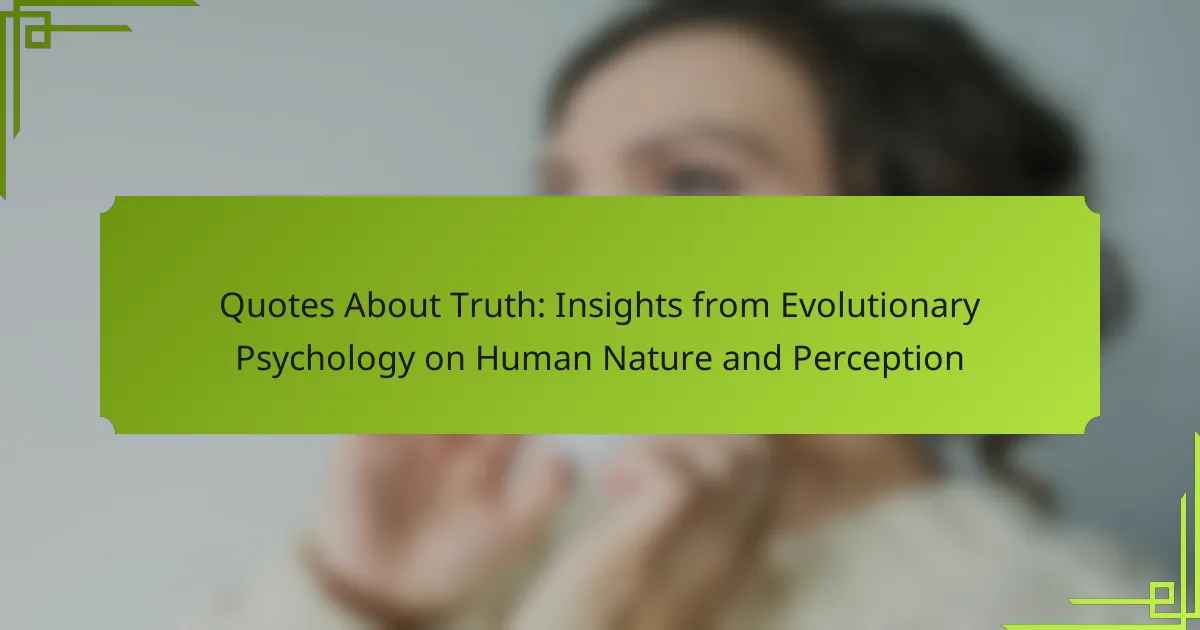Understanding the nature of truth can significantly enhance personal and professional relationships. Quotes about truth reveal the complexities of human perception shaped by cognitive biases and social contexts. Insights from evolutionary psychology highlight the adaptive significance of truth for survival and social cohesion. This exploration emphasizes the subjective nature of truth, the role of selective perception, and the importance of vulnerability in acknowledging personal truths.

What insights do quotes about truth offer in understanding human nature?
Quotes about truth reveal that human nature is complex, often influenced by cognitive biases and social contexts. Insights from evolutionary psychology suggest that our perception of truth is shaped by survival instincts and social cohesion. For example, humans tend to favour information that aligns with their beliefs, known as confirmation bias. This behaviour highlights the unique attribute of selective perception in understanding truth. Moreover, quotes emphasize the rare attribute of vulnerability in acknowledging personal truths, fostering deeper connections. Ultimately, these insights illustrate that our grasp of truth is not merely objective but intricately linked to our evolutionary history and social interactions.
How do evolutionary psychology principles shape our perception of truth?
Evolutionary psychology principles significantly influence how we perceive truth by shaping our cognitive biases and social behaviours. Human beings evolved to prioritise information that enhances survival and social cohesion, leading to a perception of truth that often aligns with group beliefs and emotional responses. This phenomenon is evident in how individuals selectively accept information that confirms their pre-existing views, known as confirmation bias. Additionally, evolutionary adaptations favour narratives that resonate emotionally, making stories more persuasive than factual accuracy. Understanding these principles reveals the complex interplay between human nature and the subjective experience of truth.
What are the common themes in quotes about truth from evolutionary psychologists?
Quotes about truth from evolutionary psychologists often explore themes of human perception and behaviour. They emphasize that truth is subjective, shaped by evolutionary processes. Common themes include the adaptability of truth to social contexts, the role of cognitive biases in shaping perceptions, and the importance of truth for survival and social cohesion. These insights suggest that understanding truth requires acknowledging its complex, dynamic nature as influenced by evolutionary factors.
What role does survival play in shaping our understanding of truth?
Survival significantly influences our understanding of truth by shaping perceptions that prioritise adaptive advantages. Evolutionary psychology suggests that humans evolved to perceive truths that enhance survival and reproductive success. For instance, beliefs about social cooperation and resource availability are rooted in survival needs. These perceptions often distort objective reality, emphasizing truths beneficial for group cohesion and individual safety. In this way, survival acts as a filter, guiding our understanding of what is true based on its relevance to our existence.
How do social dynamics influence our perception of truth?
Social dynamics significantly shape our perception of truth by influencing beliefs and behaviours. Social interactions create a context where shared narratives often overshadow objective facts. Groupthink can lead to consensus on distorted truths, as individuals prioritise social acceptance over critical analysis. Research in evolutionary psychology highlights that humans are predisposed to conform to group norms, which can distort personal perceptions of reality. Consequently, the interplay of social influences and individual cognition complicates our understanding of what is true.

What are the universal attributes of truth in evolutionary psychology?
The universal attributes of truth in evolutionary psychology include adaptability, consistency, and social functionality. Adaptability reflects how truths evolve based on environmental changes. Consistency ensures that truths remain stable across various contexts, while social functionality highlights how truths facilitate social cohesion and cooperation. These attributes shape human perception and behaviour, emphasizing the evolutionary significance of truth in survival and social dynamics.
How does the concept of truth relate to human evolution?
The concept of truth is integral to human evolution, shaping our social structures and survival strategies. Evolutionary psychology suggests that our perception of truth is influenced by cognitive biases, which helped early humans navigate complex social environments. These biases, such as confirmation bias, enhance group cohesion and trust, crucial for cooperation. As a result, truth becomes a social construct, evolving to support group dynamics and shared beliefs. This interplay between truth and evolution highlights how our understanding of reality is shaped by both biological imperatives and social contexts.
What psychological mechanisms underpin our understanding of truth?
Psychological mechanisms that shape our understanding of truth are influenced by cognitive biases and social dynamics. Evolutionary psychology suggests humans evolved to perceive truth through survival-driven lenses. Confirmation bias leads individuals to favour information aligning with pre-existing beliefs. Social validation influences perceptions of truth, as group consensus often sways individual judgment. Emotional responses also play a role; feelings can distort objective analysis. These mechanisms illustrate how our understanding of truth is not purely rational but deeply intertwined with human nature and social context.

What unique perspectives do evolutionary psychologists provide on truth?
Evolutionary psychologists provide unique perspectives on truth by emphasizing its adaptive significance for human survival. They argue that our perception of truth is shaped by evolutionary pressures that prioritise social cohesion and cooperation. This perspective suggests that truths are often subjective, moulded by group dynamics and cultural contexts. For instance, the concept of “shared truths” facilitates group bonding, enhancing cooperation among individuals. This insight challenges the objective view of truth, highlighting its role in human evolution and social interaction.
How do evolutionary perspectives challenge traditional views on truth?
Evolutionary perspectives challenge traditional views on truth by emphasizing that human perception is shaped by survival, not objective reality. This suggests that truths are often subjective and context-dependent. Evolutionary psychology posits that our understanding of truth is influenced by cognitive biases and evolutionary adaptations. For instance, confirmation bias leads individuals to favour information that aligns with their pre-existing beliefs, altering their perception of truth. As a result, these insights reveal that what we consider “truth” may be more about adaptive functionality than an absolute standard.
What unique quotes exemplify evolutionary psychology’s approach to truth?
Quotes about truth from evolutionary psychology emphasize the interplay between human nature and perception. One notable quote is by Richard Dawkins: “The truth is, we are all just animals.” This highlights the biological roots of human behaviour and cognition. Another insightful quote is from Steven Pinker: “Our minds evolved to solve problems that our ancestors faced.” This reflects the adaptive nature of our understanding of truth, shaped by evolutionary pressures. Additionally, David Buss states, “Human nature is a product of evolutionary forces.” This underscores how our perceptions of truth are influenced by survival and reproduction needs. These quotes collectively illustrate how evolutionary psychology frames truth as a construct deeply rooted in our biological heritage.

What rare insights about truth can be drawn from evolutionary psychology?
Evolutionary psychology reveals that truth is often shaped by survival instincts and social dynamics. Human perception of truth is influenced by evolutionary adaptations, prioritising information that enhances social cohesion and survival. Research indicates that humans are predisposed to accept beliefs that foster group identity, even if they conflict with objective reality. This tendency highlights a unique attribute of truth in human nature: it is often a social construct rather than an absolute. Understanding these insights can deepen our comprehension of human behaviour and societal norms.
How do cultural differences influence perceptions of truth?
Cultural differences significantly shape perceptions of truth. Variations in values, beliefs, and social norms influence how individuals interpret information and experiences.
For instance, collectivist cultures often prioritise group harmony over individual perspectives, leading to a more subjective understanding of truth. In contrast, individualistic cultures may emphasise objective facts and personal accountability, shaping a distinct approach to truth.
Research in evolutionary psychology highlights that these cultural frameworks impact cognitive biases and reasoning processes. People are inclined to accept truths that align with their cultural narratives, reinforcing their worldview.
Thus, understanding these cultural influences is essential for effective communication and conflict resolution, as differing perceptions of truth can lead to misunderstandings and disagreements.
What are some lesser-known quotes about truth from evolutionary theorists?
Evolutionary theorists often provide unique insights on truth. Here are some lesser-known quotes that reflect their understanding of human nature and perception:
1. “Truth is not a fixed entity but a dynamic process shaped by our evolutionary history.” – Unknown
2. “Our perception of truth is a survival mechanism, honed by natural selection.” – Unknown
3. “What we consider true is often a reflection of our adaptive needs rather than objective reality.” – Unknown
4. “In the realm of evolution, truth is less about facts and more about relevance to survival.” – Unknown
5. “Understanding truth through an evolutionary lens reveals its fluidity in human cognition.” – Unknown

How can understanding quotes about truth improve our daily lives?
Understanding quotes about truth enhances daily life by fostering self-awareness, promoting honesty, and encouraging critical thinking. These insights, rooted in evolutionary psychology, reveal how our perceptions shape interactions. For instance, acknowledging the subjective nature of truth can lead to more empathetic communication. As a result, individuals may navigate conflicts with greater understanding and resilience. Embracing these quotes can ultimately transform personal and professional relationships, leading to a more harmonious existence.
What practical steps can we take to align our perceptions of truth with evolutionary insights?
To align our perceptions of truth with evolutionary insights, we can adopt several practical steps. First, cultivate awareness of cognitive biases that distort our understanding of truth. Second, engage in critical thinking practices to evaluate information objectively. Third, foster open dialogue that encourages diverse perspectives, enhancing our collective grasp of reality. Lastly, integrate insights from evolutionary psychology to understand the innate tendencies shaping our perceptions, leading to a more nuanced view of truth.
What common mistakes should we avoid when interpreting quotes about truth?
To avoid common mistakes when interpreting quotes about truth, focus on context and intent. Misunderstanding the speaker’s perspective can lead to misinterpretation. Additionally, neglecting the historical or cultural background of a quote may distort its meaning. Be wary of taking quotes out of context, as this can alter the intended message. Lastly, avoid oversimplifying complex ideas into single phrases, which can diminish their depth.
How can we apply evolutionary psychology to enhance our understanding of truth in relationships?
Applying evolutionary psychology can enhance our understanding of truth in relationships by revealing innate human behaviours. Evolutionary psychology suggests that our perception of truth is influenced by survival instincts and social dynamics. For example, individuals may prioritise honesty to foster trust, which is vital for cooperative relationships. Studies indicate that truthful communication strengthens bonds, promoting group cohesion. Additionally, evolutionary perspectives highlight how deception can arise as a strategy for self-preservation, complicating our understanding of truth. Recognising these patterns helps navigate interpersonal dynamics more effectively.
